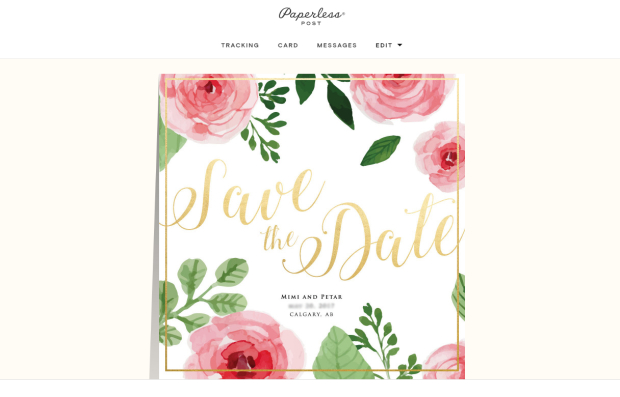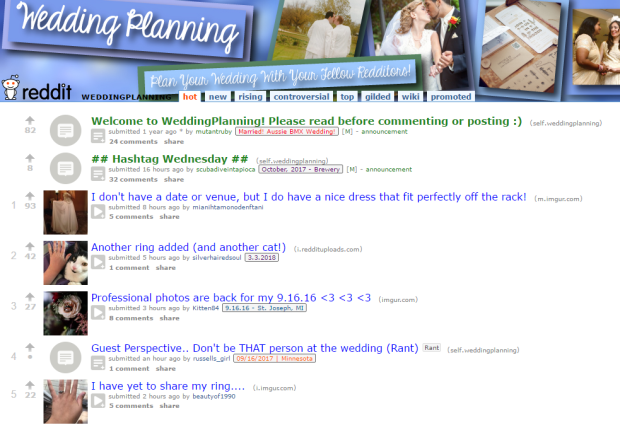The widget on my phone tells me there are a little over 200 days until my wedding day. I’ve been patiently (mostly impatiently) checking this timer every day, wondering when the numbers will drop to zero. At this stage in the game, all that’s left to book is catering, and it feels like I’m doing something wrong. I should be panicking and stressed, right? Isn’t that what all brides feel like?
Throughout this process, I’ve learned a lot about the planning experience, a lot about myself, and a lot about the business of weddings. Here’s a summary of what I’ve personally learned over the past year:
Involving Your Fiance: During Thanksgiving dinner, I asked the table what was one thing each person was thankful of this year. Petar, my fiance, said that he’s thankful I’m planning the wedding. In a way, that’s true, but along the way, every time there’s a crossroads or a major decision (which photographer, what style of invitation, who to invite, etc), I’ve always been candid with him and asked for his opinion. This person will be your future spouse, so there should be a safe space for open discussion, not a fixed plan for the wedding you’ve been dreaming of since you were five years old.
Having a Longer Engagement: My countdown widget started over 500 days. Although I’ve been telling Petar almost everyday, “Let’s just elope. This engagement is way too long!” in the long run, it’s the best decision we’ve made. We had our choice of venues and vendors, because many of them were shocked that we were planning so early. This is especially true for higher demand locations, for instance Toronto, New York, or L.A. I follow a wedding group for Toronto, and people were saying that some venues were fully booked for 2017 in early or mid-2015.
Budgeting, Budgeting, Budgeting: Before we did anything (besides choosing a date), Petar and I sat down with a list of categories and wedding items/services (which I stole from lists on the Internet). I made a spreadsheet with a few columns: Budgeted Amount, Vendor Estimate, Amount Spent, Gifted Amount, and Variance:

We went through all the categories, and we searched and guesstimated the budgeted amounts based on our total proposed budget. Every time I did more research, I could adjust the budgets, keeping in mind the total costs and if they went up or down. Anytime we booked anything or received a quote, I would fill out the Vendor Estimate or Amount Spent categories. We’re lucky to have our parents step in for a few payments, so I would add that to the Gifted Amount section. The budget helps to know what you’re working towards and helps you not to overspend.
Keeping Track of Information: In addition to this budget spreadsheet, I have a Google Sheet with different tabs that’s my Master Planner – everything and anything to do with planning the wedding is on this. It’s synced to all devices, and it tells me all the details about researched options, prices, contact information, deadlines, timelines…you name it!

This Master Planner sits in a Google Drive folder that’s organized by folders, where I’ve scanned any contracts, created Google Docs with questions and answers from vendors, stationery designs, and more. I also have a binder with paper versions of my contracts, in case our information gets lost in the cloud (it happens!).
Understanding the Business: The wedding business is actually just that – a business. At any time I speak to a vendor, I hear their “Congratulations!” and think that this must be the thousandth time that they’ve said this across their careers. The business is expensive (1/3 of your budget for real flowers?!) and competitive, so there’s going to be people and companies that try to sell you things above and beyond your budget. It’s up to you and your fiance to think, “Do we really need this?” Recently, I told someone that we weren’t going to hire a DJ, and they looked at me with a confused expression. Just because people market their services, doesn’t mean those services are must-haves.
Breaking Free from Traditions: I was recently caught into this constricting spiral – should I have paper invitations and save the dates? How would I pay for inner envelopes, calligraphy, postage, embellishments, etc? Is it rude to have no mailed RSVPs, and is it improper to have a honeymoon registry instead of a traditional registry? With all these questions swirling in my head, I just thought back to what was truly important: My guests don’t live in the 1950s. My guests are digitally-savvy, smart people who can figure out how to RSVP online. Just because your wedding is a formal event doesn’t mean it should be a formal event from the past.

Accepting Cultural Sensitivities: My fiance and I are an interracial couple, which means we have many different customs to adhere to. For example, I can’t send invitations to my cousins and their kids. In Taiwanese culture, I can only send invitations to the heads of the families – my uncles and aunts. In Bulgaria, you have to make sure waiters don’t clear any plates until the very, very end, because they love to sit and mingle for a while with food on their plates. Knowing, appreciating, and adapting to these cultural differences is key, because you won’t be able to make people happy otherwise.
Connecting to a Community: This community is a group of brides and grooms just like yourself, struggling to plan their wedding. I’m subscribed to several Facebook groups and the “Weddit” community on reddit (r/wedding, r/weddingplanning). People are always looking to ask for advice and sell their items. I got my pillar vases on a Facebook group for a huge steal, and I’ve found most of my vendors from recommendations on these groups. It’s also nice to see that others are having the same troubles as you so you don’t feel lost and overwhelmed.

Embracing Your Family: There’s no avoiding it. Your family will be your biggest support, but your family will also be your biggest headache. They’ll annoy and excite and frustrate and encourage you. I found a beautiful venue overlooking a reservoir, but my future father-in-law had reservations with the size of the venue. Good thing we listened to him and adapted, because otherwise we wouldn’t have the amazing reception venue we have now. You’ll also have them all under one roof at on time, so it’s better to just embrace these dysfunctional, lovable people when you can.
Knowing Things Will Work Out: I read many follow-up and thank you posts from people after their weddings. All of them listed what went well and what didn’t, but they all said it was one of the greatest days of their lives. Recently, I had a mental dilemma when I questioned for hours whether or not I should spend money on chair covers. I took a step back and thought, “What am I doing?” Sometimes, stepping back and telling yourself it’ll all be worth it in the end is the best thing to do. That, and binging Netflix with your fiance and cuddling on the couch together late into the night.
